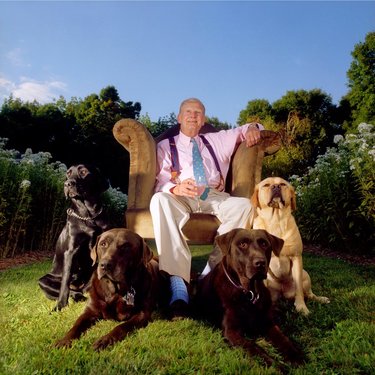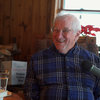More than a rebrand: Hilltown Commons focuses on local good
— Photo from the Carey Institute for Global Good
William Polk Carey, relaxing with his dogs in Rensselaerville, died in 2012 just before his purchase of the Rensselaerville Institute property was announced. New leadership aims to ditch the “heady” and “highfalutin’” ideals of the globally-oriented not-for-profit, as the de facto executive Virginia Thomson put it, in favor of a grassroots approach to social betterment.
RENSSELAERVILLE — Under new leadership, Hilltown Commons, formerly known as the Carey Institute for Global Good, is shifting its focus to grassroots community-building and skill-sharing that aims to strengthen local bonds across all four of the Hilltowns: Berne, Knox, and Westerlo as well as Rensselaerville.
Hilltown Commons board members Virginia Thomson and Doug Parvis spoke with The Enterprise this week about how the organization has fundamentally transformed itself with an 11-member board — of which only four were members of the Carey board — and, soon, a permanent replacement for Gareth Crawford, the chief executive officer who resigned earlier this year.
“I think it was a bit heady in the past,” said Thomson, who joined the board in November and is now its de facto executive as the board searches for a more permanent one. “Here, we are able to run our hands through the soil and really be a part of what this place is. And we really hope that becomes the essence of it, rather than a more effete, intellectual state of affairs.”
Thomson is a Rensselaerville resident with a background in nonprofit management and consulting. Parvis, who works at the company Yondr, is a former Carey Institute board member and is currently in the middle of a move from California to Rensselaerville.
The biggest difference between the Carey Institute and Hilltown Commons, Thomson said, is that the former “wasn’t as much a place of community in the past,” while that will be the main thrust of the new organization.
Also, where only about half of the Carey Institute board had been local to the area, every member of the Hilltown Commons board resides in one of the Hilltowns, Thomson and Parvis said, highlighting the community focus.
Already in partnership with two different local organizations that use the 100-acre campus — the wellness company Wisdom Roots, and theater troupe Rville Stage Creations — Parvis said that Hilltown Commons is prioritizing “practical educational workshops” that will bring people together over three- to five-day periods.
There’s also now a pub (called “The Pub”) open from 3 until 9 p.m. on Fridays at the Weathervane, also known as Carriage House, he said, which serves pizza from Be Golden Farms from 4 until 8 p.m.
Parvis said that the campus may still host a small number of weddings — no more than four each year — for local folks, but that it won’t be as large a part of what they hope will become a self-sustaining business model as had been expected at the Carey Institute before the COVID-19 pandemic shut down large gatherings.
The seed of the Carey Institute had been an endowment left by its namesake, the late William Polk Carey. The organization recognized that it would need a more sustainable source, but only in 2020 did it ever take more money in than it spent, with the annual losses since the group’s inception in 2014 typically being more than $500,000.
Thomson said that Hilltown Commons has a “good, friendly relationship” with the Carey estate, but it’s “not clear that it will be a funding relationship in the future.”
Instead, she said, “We will continue to raise money from individuals and institutions, but we also hope that our business model will evolve to the point where it can support the entire program.”
“As we build that model,” Thomson said, “we hope to do more and more work that benefits the Hilltown communities, including work in agriculture, work in the environment, work in health and well being — so all the areas that Hilltown folks have told us they’re interested in having somewhere to go participate in.”
Parvis said there’s a hope that the prestigious Logan Nonfiction Program will return to the campus, but that there’s no guarantees yet.
“We’re also exploring other programs similar to that,” he said, “bringing around 12 fellows to the campus for a total of around 50 nights, spread out over several months, fully underwritten by an institution.”
Parvis said he’s optimistic about the model, theorizing that people are still “starving for in-person interaction” after the pandemic, and in the midst of a more general technology-oriented culture, that will make medium-term workshops at the campus very appealing.
He said he hopes that participants will “stay in touch with one another because they went through this amazing experience on our beautiful campus.”
Thomson said the organization will try to maintain those organic connections through what she described as an alumni network.
“We’re going to keep people in touch and encourage them to stay in touch as much as they want to, and support the creation of community, whether it’s community of interest, [or] community of place,” she said.
History
The iteration of the campus being the Carey Center for Global Good is just over a decade old.
The roots of the center are a century old, founded by Laura Talmage, an artist and the wife of Frank Huyck Jr., who started a series of meetings in Rensselaerville in 1924, mindful of preventing another war like the Great War. Leaders in economics and education, in history and labor came to the Country Forums on Human Relations.
The campus grew with donations from wealthy summer residents and, in 1963, it was chartered by the State University of New York and named The Institute of Man and Science, attracting luminaries like United Nations Secretary General U Thant as well as ambassadors to the United Nations and experts on space and science, on history and philosophy. Science fiction writer Isaac Asimov became a regular visitor.
The institute became known as “the think tank with muddy boots” when, in the 1970s, it switched its focus to learn how self-help could restore a community psychologically as well as physically. The self-help philosophy was used for government offices and not-for-profits and even for low-performing schools.
In 1983, after several women objected to the “man” in its name, the organization became The Rensselaerville Institute.
The land had been purchased by William Polk Carey, a trustee of the institute for 20 years and the founder of W. P. Carey & Co., a real-estate financing firm, who died in 2012 just before the sale was announced.
In 2014, its new director, Carol Ash, had lofty goals in mind, comparing the institute’s future direction to Yaddo, a well-known artists’ retreat in Saratoga Springs. The Carey Institute eventually teamed up with the Logan Foundation, providing support and a safe haven for creators of long-form journalism — books, films, and more.
Carey’s wish had been to see the institute’s original heritage — back to Laura Talmage’s Country Forums on Human Relations — for global understanding to continue but also to support the local community.
In 2020, due in part to struggles caused by the pandemic shutdown, the Carey Institute for Global Good put its 100-acre campus up for sale — but the property did not sell.


